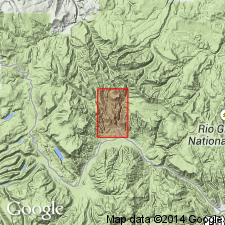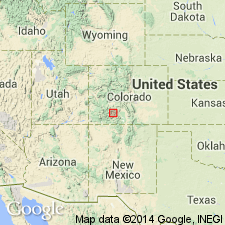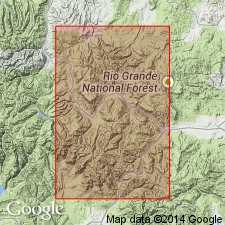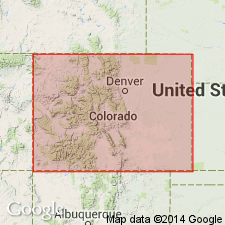
- Usage in publication:
-
- Equity quartz latite*
- Modifications:
-
- Original reference
- Dominant lithology:
-
- Quartz latite
- AAPG geologic province:
-
- San Juan Mountains province
Summary:
Equity quartz latite of Alboroto group of Potosi volcanic series. Entirely massive rock, and in large part at least a single great flow, forming top formation of Alboroto group of Potosi volcanic series. Thickness 0 to 1,000 feet. Overlies, rather regularly, the Campbell Mountain rhyolite, and therefore occupies about same position in section as Phoenix Park quartz latite, from which it differs chiefly in its more massive character and, slightly, in its composition, which is somewhat nearer that of a rhyolite. The two latites have not been found in contact, but are believed to be very closely related and to represent different phases of same period of eruptive activity. Age is Miocene.
Named from development near Equity Mine, Creede district, southwestern CO. [Equity Mine in secs. 34 and 35, T. 43 N., R. 1 W., Lat. 37 deg. 56 min. 12 sec. N., Long. 106 deg. 57 min. 34 sec. W., San Luis Peak 7.5-min quadrangle, Mineral Co., southwestern CO (USGS GNIS database, USGS historical topographic map collection TopoView; accessed February 27, 2013).]
Source: US geologic names lexicon (USGS Bull. 896, p. 694).

- Usage in publication:
-
- Equity Quartz Latite†
- Modifications:
-
- Abandoned
- AAPG geologic province:
-
- San Juan Mountains province
Summary:
Abandoned as a unit in the Creede district, [Mineral] County, Colorado (San Juan Mountain province). Rocks formerly assigned to Equity are part of Nelson Mountain Formation as redefined in this report.
Source: GNU records (USGS DDS-6; Denver GNULEX).

- Usage in publication:
-
- Equity Member*
- Modifications:
-
- Reinstated
- Age modified
- AAPG geologic province:
-
- San Juan Mountains province
Summary:
Pg. A14-A15, A80-A81. Steven and Ratte (1964, USGS Prof. Paper 475-D, p. D61; 1965, USGS Prof. Paper 487, p. 37) abandoned the Equity Quartz Latite, considering it to be same as Nelson Mountain Tuff. Subsequent mapping has shown the Equity as defined by Emmons and Larsen (1923) is completely equivalent to the unnamed densely welded, crystal-rich, quartz latite intracaldera member of the Rat Creek Tuff, which accumulated within the subsiding core of the San Luis caldera concurrently with eruption. Thus, unit is reinstated as the Equity Member, upper member of the Rat Creek Tuff. Is younger than the outflow member of Rat Creek and older than the outflow member of Nelson Mountain Tuff. Nelson Mountain Tuff was erupted from the Cochetopa Park caldera shortly after the Rat Creek Tuff was erupted from the San Luis caldera. Age of Equity Member is changed from Miocene --to-- late Oligocene.
Source: Publication.

- Usage in publication:
-
- Equity Member*
- Modifications:
-
- Revised
- AAPG geologic province:
-
- San Juan Mountains province
Summary:
Authors believe original correlation of Nelson Mountain Tuff with the Equity in the San Luis caldera is correct. Is therefore removed from Rat Creek Tuff and reassigned to Nelson Mountain Tuff. Name applied in the Creede district, Mineral County, Colorado (San Juan Mountain province). Age is late Oligocene.
Source: Modified from GNU records (USGS DDS-6; Denver GNULEX).
For more information, please contact Nancy Stamm, Geologic Names Committee Secretary.
Asterisk (*) indicates published by U.S. Geological Survey authors.
"No current usage" (†) implies that a name has been abandoned or has fallen into disuse. Former usage and, if known, replacement name given in parentheses ( ).
Slash (/) indicates name conflicts with nomenclatural guidelines (CSN, 1933; ACSN, 1961, 1970; NACSN, 1983, 2005, 2021). May be explained within brackets ([ ]).

